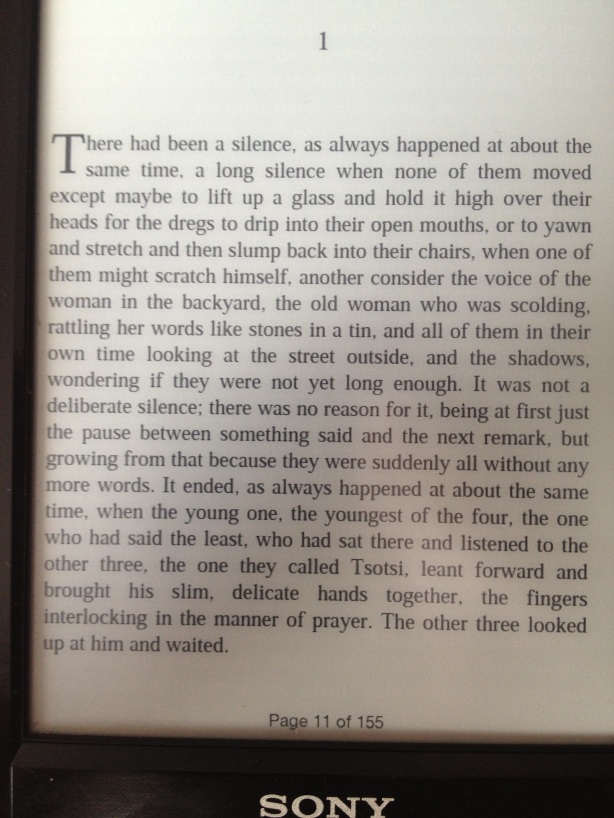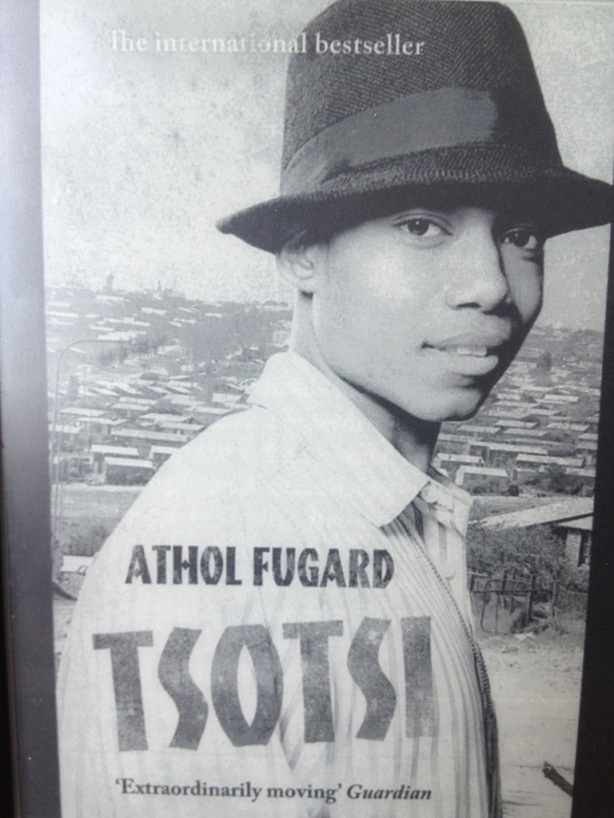These are the opening lines of the novel. From an OCR GCSE point of view, opening lines are always likely to be picked up as possible context questions. Now, for the sake of speed I have no intention of copying whole pages out, so please bear with the wobbly photographs!
Nor am I pretending to cover every point on this page: what follows is no more than a collection of (probably the most patent and obvious) observations as they occur to me.
The first thing that leaps out at me here is the length of the sentences: an entire page comprising just four sentences. The first sentence takes up ten whole lines; the last sentence takes up less than one line. What could a student say about that? That Fugard’s control of the sentence structures creates a rhythm and a direction, a momentum out of languor? If so, a student could go on and suggest that there is a parallel between the content of the lines which describe a listless afternoon coalescing into an evening of activity. As so often elsewhere in the book, Fugard’s language holds a rhythm that bears its own meaning.
Let us look at the opening sentence in more detail and we see that this is a sonorous writer, a lyrical writer straight away. His language uses alliteration and onomatopoeia in ways which would not be out if place in a poem and need to be analysed in the same way.
…to lift up a glass and hold it high over their heads for the dregs to drip into their open mouths or to yawn and stretch and then slump back into their chairs…
. We can practically hear the boys’ anticipation for the final drop of beer: the long vowel sounds of the ‘e’ in “dregs” delaying and contrasting with the short ‘i’ and plosive ‘p’ in “drip”; the long vowels of “yawn” and “stretch” drawing out the listless ennui which Fugard is describing.
From these opening lines, students should be aware that they will need to drag out of their subconscious those long forsaken key poetry terms!
Let’s look further in the same sentence as Fugard describes the neighbour’s voice.
…the old woman who was scolding, rattling her words like stones in a tin…
.
This is a tiny detail, admittedly but critical to the passage: up until this point, Fugard could have been describing a middle class barbecue in suburban England – indeed many of my parents’ barbecues ended with people slumped in chairs, scratching themselves and finishing the dregs of their drinks – but this simile is our first insight into the poverty of the setting. Only the poorest, most disadvantaged sections of society would be reaching for similes such as “like stones in a tin” to describe a voice. What we are being treated to here is a beautiful, lyrical prose depicting abject poverty; the poetry of poverty.
But what a powerful simile! What a simple and potent way to describe both the harsh sounds of the voice and her implicit dissatisfaction and disapproval of the four boys. As this is being tested in the context of Prose From Other Cultures and understanding of context is being tested, this one simile opens up an opportunity to discuss the poverty of 1950s Sofiatown in Johannesberg, South Africa.
This one simile therefore clarifies that the boys’ languor is not suburban contentment but an ennui almost symptomatic of the diseased state in which the black community existed: robbed of pride, self-esteem, opportunity, education or employment by a white apartheid system the black youths have nothing gainful with which to employ themselves.
Let’s move on to character: no one is fleshed out here except for
…the young one, the youngest of the four, the one who said the least, who sat there and listened to the other three, the one they called Tsotsi…
Again, we are being handed a gift of an opportunity to gain context marks: the name Tsotsi is an urban slang from South Africa meaning “thug”. It is more than simply thug though: it refers to an imitation in 1950s South Africa of 1940s American gangsters in style of dress, violence and gang loyalty and rivalry. Within a single word, students are gifted opportunities to mention South Africa, Sofiatown, the violence that plagued its streets, the gangsters who ruled its slums, even the language of its streets which acquired its own name, tsotsitaal.
But this is not the end of the use we can put this quotation to. He is “the one they called Tsotsi”. It is therefore a label, a tag rather than a name. So? Might ask some students…. Well a name connects a character to a history, a family, an identity; a label is bereft of heritage. A name identifies; a label describes. As we later learn that Tsotsi has no memory of his past and the book revolves around his reclamation identity, this would be a critical issue to pick up.
But again, it’s too soon to leave this quotation: as he is “the one they called Tsotsi,” a reader may infer that the label Tsotsi is one forced upon him, one imposed by external factors rather than one chosen himself. On the surface, this seems inconsistent with what we learn later – that Tsotsi adopted the name himself after his mother was taken. But students could question who “they” may be: the other members of the gang; society; whites.
There are intriguing features to the presentation of Tsotsi here: he is clearly the gang’s leader as “The other three looked up at him and waited” but he is also “the youngest”; the gang is clearly capable of murder and violence from the remainder of the book, yet Tsotsi’s hands are “slim” and “delicate” and his fingers are “interlocking in the manner of prayer”. Whilst incongruous at this point, the novel reveals itself to be an allegory if redemption and becomes explicitly Christian in terms of that redemption and this opening image of prayer could be interpreted as an interesting early pre-figuration of that redemption.

